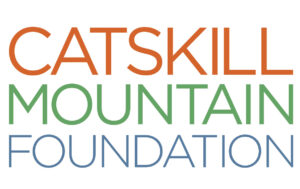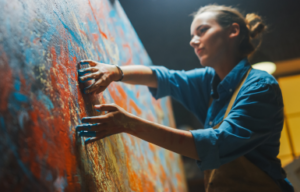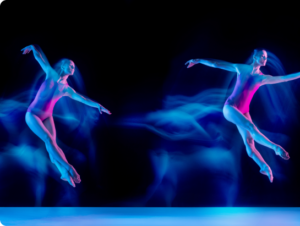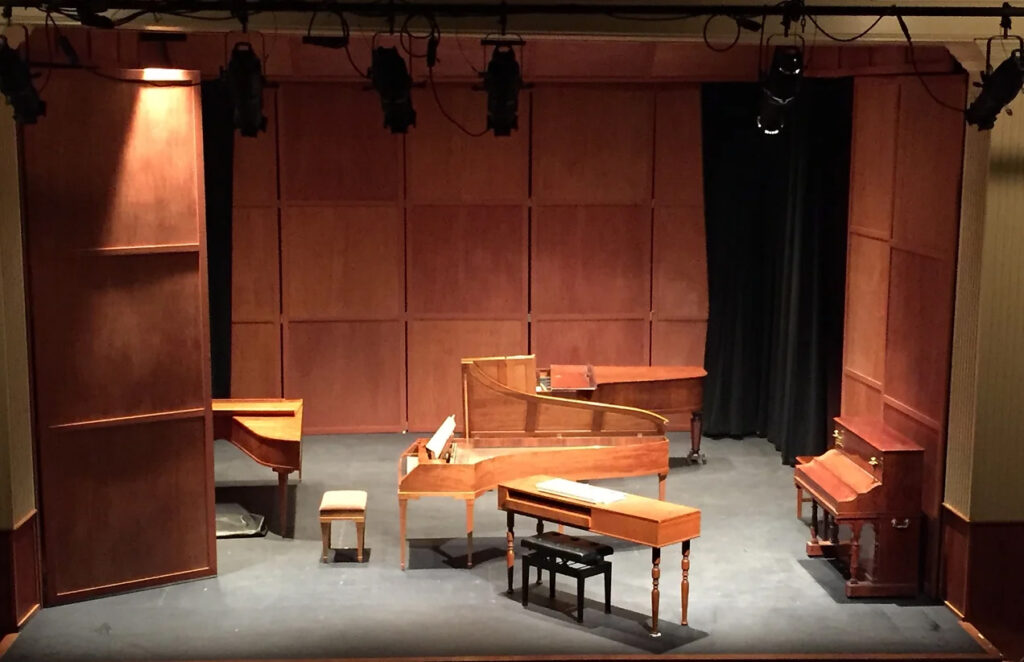
Historic pianos on stage at the Doctorow Center for the Arts in Hunter.
Academy of Fortepiano Performance 2025 Festival & Workshop
From May 28 to June 8, the Academy of Fortepiano Performance will conduct its eighth annual classical music festival and workshop, including a 3-day technical workshop, a week-long schedule of master classes, individualized lessons, recitals, a faculty and guest artist concert and the final student concert. Over the years, the academy has flourished, beginning with a few dedicated students from Juilliard and other music schools in New York City to the current crop of students hailing from around the globe.
The study of fortepianos differs from modern piano education in that each piano is unique. Devoted faculty share their deep understanding of the pianos and their makers, the music originally composed for and played on these instruments, how to read musical scores written in the period, and how to play them with the requisite skill and expression to elicit the audience response desired by the composers.
Meals provided by Fellow Café and comfortable housing owned by the Catskill Mountain Foundation allow time for ample exploration in the Piano Performance Museum and study time. Students share among themselves and learn from their experiences, while audiences delight in free midweek afternoon concerts in Weisberg Hall at the Doctorow Center for the Arts. The Academy of Fortepiano Performance is a celebration of the unofficial start of the summer with classical music played the way its composers intended in the beautiful surroundings of Hunter, New York—making it a truly unique summer music festival experience.
What to Expect from the Festival and Workshop?
Each summer, co-Directors Audrey Axinn and Maria Rose bring together young professionals of the highest caliber to engage in intensive exploration of mostly 18th and 19th century keyboard repertoire on period keyboard instruments from the Catskill Mountain Foundation’s Piano Performance Museum as well as faculty-owned harpsichords and fortepianos.
This summer the faculty includes: Audrey Axinn, faculty member at The Juilliard School, Manhattan School of Music and Mannes School of Music; Maria Rose, a renowned performer and scholar and senior editor at RILM; Masayuki Maki, faculty at Queens College; and Andrew Willis, emeritus faculty, University of North Carolina at Greensboro.
What is the AFP Historical Piano Technology Workshop all about?
Alongside the main performance program, the Academy offers a one-of-a-kind technical workshop focused on the conservation and maintenance of historical keyboard instruments. Let’s hear from the directors who lead this insightful part of AFP.
Masayuki Maki, Director and Faculty
The workshop is designed for both piano technicians and artists who are interested in the technology, maintenance and conservation of the harpsichords, clavichords, Viennese fortepianos, and various types of antique pianofortes. It takes place in the Piano Performance Museum of the Catskill Mountain Foundation, where a variety of historical keyboard instruments are kept in playing condition. Those collections are fine examples of the rich history and craftsmanship of the keyboard instruments, and how restorations and conservations can be done to those instruments. During the workshop, we will learn the unique and intricate action mechanisms and gain hands-on experience with the techniques used to maintain and restore those historical pianos and harpsichords. We will also discuss the conservation methods of the antique pianos, which will deepen the understanding of how to preserve those musical and technological treasures for future generations.
Richard Hester, Director and Faculty
This Hunter seminar/mini course is on par with only two other places offering such activity. What the technical workshop seeks to ask, while exploring essential techniques of keyboard care with specialty maintenance, are the whys and wherefores with how these original pianos, and their evolving designs are reflective of the cultures of their day, so the discussion finds application for several areas of interest. Interactive dialogue with the introduction into conservation techniques becomes a unique offering for technicians; but as well, for pianists seeking greater understanding of very interesting instruments.
What do faculty and alumni say about the Academy of Fortepiano Performance?
From seasoned faculty members to passionate returning students, AFP is a gathering place of deep connection, artistry, and discovery. Let’s hear from some of the people who make this Academy so exceptional.
Insights from Audrey Axinn, Co-Director and Faculty: How AFP builds a culture of musical excellence
The level of discourse and performance each summer is truly outstanding with classes and performances (many of which are open to the public) and sharing of knowledge and ideas from the morning well into the night every day. From its beginning, AFP has been an extraordinary think tank of performance practice drawing exciting rosters of faculty and guest artists and extraordinarily talented students. Students come from The Juilliard School, Mannes School of Music, Manhattan School of Music, Indiana University and Oberlin Conservatory to name a few schools. Many of them are winners of prestigious competitions and already have vibrant careers as performers. The work of this talented group of students will culminate in a shared concert on June 7 at 7pm.
Maria Rose, Co-Director and Faculty: Reconnecting with authentic sound worlds through period instruments
The students will experience first-hand how the piano music of the 18th and 19th century sounds different on the instruments from that period and how this affects their interpretations. All sensitive musicians are good listeners and hearing the different sounds coming from the period instruments places them immediately in a sound world more akin to what composers would have heard in earlier times. The availability of all the different pianos at the Piano Performance Museum affords this opportunity and the students have often described the workshop as a “smorgasbord” where they can develop new and refreshing ideas about the music.
Patricia García Gil, Alumna: Reflection on community, belonging, and artistic growth at AFP
I was fortunate to attend one of the early editions of the Academy of Fortepiano Performance in 2021—those still-strange, cautious pandemic times—and found myself immersed in a bubble where fortepiano culture was not only the centerpiece, but also the intergenerational thread connecting a passionate, supportive community.
That year, ten fellows shared everything—repertoire, practice time, laughter, questions—and the faculty, refreshingly, placed themselves not above us but among us, ready to learn alongside. It was one of the most enriching experiences of my life; I had just arrived in the U.S., and this sense of belonging changed everything, forming long-lasting friendships and professional bonds. I returned the following year, again filled with joy and discovery, which serendipitously overlapped with an inspiring HKSNA conference and led to my joining the board of HKSNA and eventually, to co-organizing the International Fortepiano Salon—a popular, richly textured program supported by the Catskill Mountain Foundation.
Co-hosting it with AFP faculty has been a privilege, particularly our most recent edition, which explored overlooked topics and voices: Black, Asian, and women composers and musicking practices that have too long remained on the margins. I’ve also been lucky to perform repeatedly at the Piano Performance Museum, home to one of the most complete and important historical keyboard collections in the U.S.—if not the world. Its curator is an extraordinary steward of this sonic heritage, from whom I’ve learned a great deal, and with whom I hope to collaborate further, perhaps linking future projects with Cornell, where I am currently Artist in Residence and Postdoctoral Fellow.
I’m especially eager to explore ways to teach the next generation not just how to play these instruments, but how to maintain them—an essential practice for preserving these rare, magical tools of sound. They’re more than instruments: they are sources of knowledge, asking you to listen differently, adjust your touch, expand your imagination, and be responsive rather than prescriptive.
This August, I will be privileged to return to the AFP for a new project centered on Louise Farrenc, whose 150th anniversary we mark in 2025. A pioneering composer, virtuoso pianist, and educator, Farrenc was the only woman professor at the Paris Conservatory in the 19th century. She fought for equal pay, wrote powerful symphonies and award-winning chamber works, and helped revive early keyboard music through her groundbreaking anthology Le Trésor des Pianistes—a treasure, indeed.
Julian Jenson, Alumnus: How AFP inspired a career in historical piano performance
Thanks to a Zoom conversation with Audrey Axinn in late fall 2020, I heard about and attended the Academy of Fortepiano Performance in the summer of 2021. I am proud to say that experience altered the course of my professional career and artistic development. That summer, I met musicians of the highest order—people I call my colleagues, my mentors, and my friends. Through their help, as well as the incredible collection of pianos at the CMF, I redefined what a “piano” can look and sound like. Since that first experience, I was set on a new path, and now I specialize in early piano performance as a doctoral student at Temple University. I’m so thankful to Audrey Axinn, Maria Rose, and the staff of the Catskill Mountain Foundation for allowing me to return to the AFP several summers since, both as participant and featured artist.
The upcoming recital I will play at CMF is a direct result of their support, along with my research at Temple University’s Boyer College of Music, where I study under Dr. Joyce Lindorff. I will be featuring the piano music of several women who lived in South and Central America in the 19th century. In their lifetimes these women kickstarted a burgeoning culture of musical excellence. These little-known musical gems tell the story of how the world of classical piano performance today still feels the impact of these trailblazing women nearly two centuries later.
Stephanie Schmidt and Robin Morace, Alumni: The Magic of Hunter’s historical pianos
Stephanie Schmidt and Robin Morace are two-time participants in the Academy of Fortepiano Performance. While they both enjoy performing on a variety of historical keyboard instruments across North America and Europe, Hunter’s Piano Performance Museum holds a special place in their distinct artistic lives. Stephanie’s enthusiasm for domestic pianofortes is deepened through time spent with square pianos made by Clementi and Geib, in addition to the other beautiful instruments at the PPM.
To enhance the magic of these instruments’ voices, she will draw contemporaneous repertoire from a familiar source; the writings and personal musical collection of Jane Austen. Robin’s area of expertise highlights a different aspect of the museum; the well-loved romanticism of the mid-nineteenth century. He will continue the literary theme with works by Schumann, E.T.A. Hoffman, Friedrich Schiller, and Liszt presented on two of the collection’s most striking instruments, grand pianos by Graf and Broadwood. Both Stephanie and Robin are grateful to the Foundation and to the faculty of the AFP for the educational and artistic values that are shared and affirmed during each visit to Hunter.
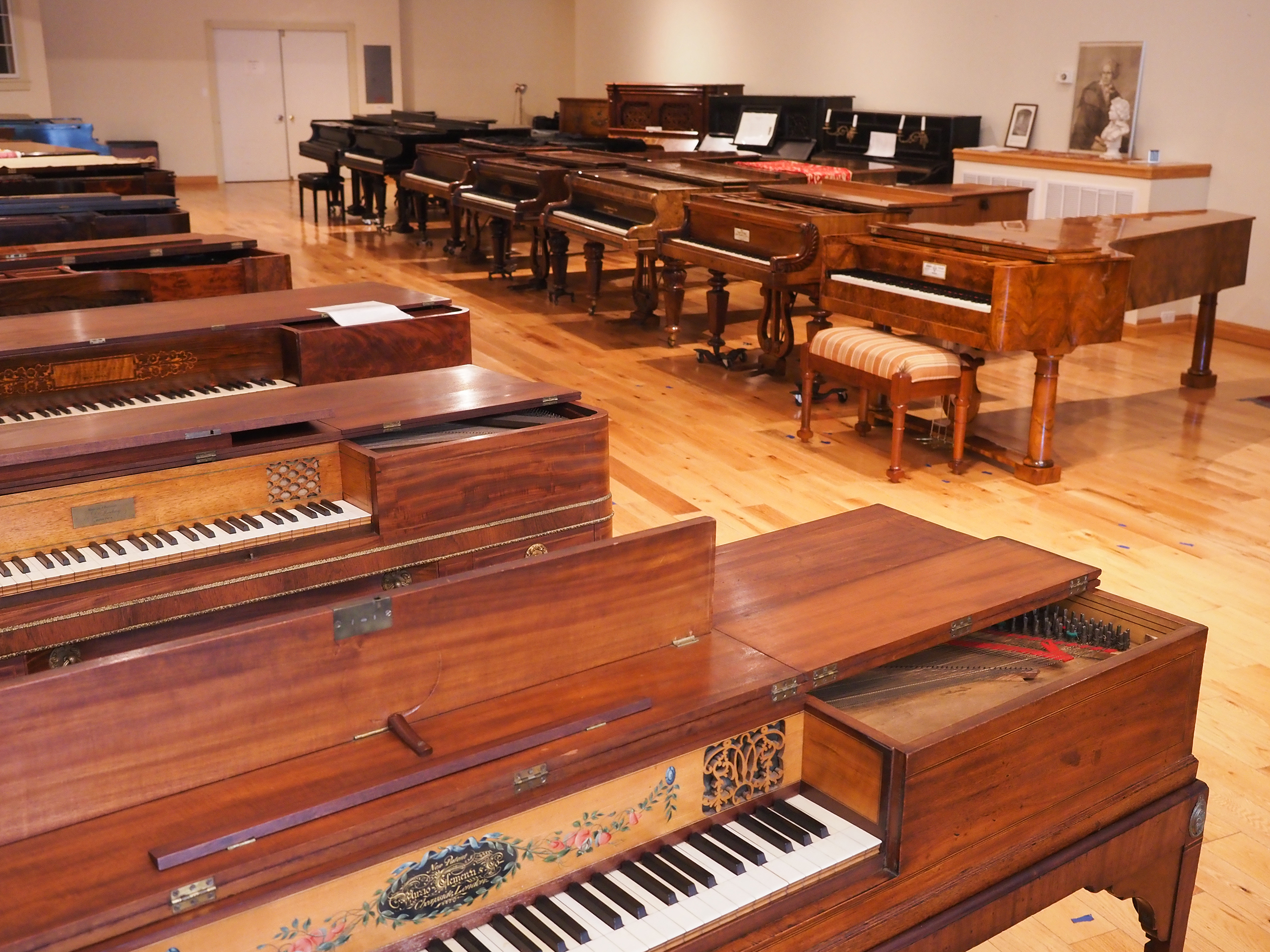
The Piano Performance Museum in Hunter.
About the Academy of Fortepiano Performance
The Academy of Fortepiano Performance is a perfect introduction for pianists who have an interest in playing early instruments, as well as an intensive study opportunity for experienced students of period performance practice. Led by renowned performers and specialists, students will participate in lessons, master classes, and workshops supported by plentiful access to pianos from the 18th and 19th century or their modern replicas. Daily individual instrumental lessons are complemented by group demonstrations, and the week-long study culminates in a final student concert.
Hosted by the Catskill Mountain Foundation’s Piano Performance Museum in Hunter, NY, this unique Academy benefits from a gorgeous natural setting, convenient and comfortable lodging and meals, and a beautiful and intimate concert hall, which is the setting for faculty and student performances.
How to apply and participate in the Academy
The Academy of Fortepiano Performance is open to college and conservatory students, professionals, and adult amateurs, with advanced high school students welcome to attend with a parent or chaperone. Auditors are also welcome to attend all events for a daily fee.
For more information about how to apply and participate in the Academy, please visit catskillmtn.org or academyfortepiano.org.
